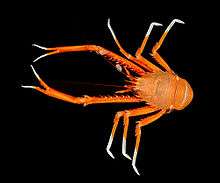Chirostyloidea
Chirostyloidea is an anomuran taxon with squat lobster-like representatives. It comprises the three families Chirostylidae, Eumunididae and Kiwaidae.[1] Although representatives of Chirostyloidea are superficially similar to galatheoid squat lobsters, they are more closely related to Lomisoidea and Aegloidea together forming the taxon Australopoda.[2] No fossils can be confidently assigned to the Chirostyloidea, although Pristinaspina may belong either in the family Kiwaidae or Chirostylidae.[3]
| Chirostyloidea | |
|---|---|
 | |
| Eumunida picta | |
| Scientific classification | |
| Kingdom: | |
| Phylum: | |
| Subphylum: | |
| Class: | |
| Order: | |
| Infraorder: | |
| Superfamily: | Chirostyloidea Ortmann, 1892 |
| Families | |
| |
Genera
- Chirostylidae Ortmann, 1892
- Chirostylus Ortmann, 1892
- Gastroptychus Caullery, 1896
- Hapaloptyx Stebbing, 1920
- Uroptychodes Baba, 2004
- Uroptychus Henderson, 1888
- Eumunididae A. Milne-Edwards & Bouvier, 1900
- Eumunida Smith, 1883
- Pseudomunida Haig, 1979
- Kiwaidae Macpherson, Jones & Segonzac, 2005
- Kiwa Macpherson, Jones & Segonzac, 2005
gollark: 🌵 🌵 🌵
gollark: Is lignum.
gollark: Uk
gollark: `uninstall`
gollark: <@278889690596376576> please fix it, how am I meant to tell @everyone to install potatOS now?
References
- "Chirostyloidea". WoRMS. World Register of Marine Species. 2012. Retrieved September 14, 2012.
- K. E. Schnabel; S. T. Ahyong; E. W. Maas (2011). "Galatheoidea are not monophyletic – molecular and morphological phylogeny of the squat lobsters (Decapoda: Anomura) with recognition of a new superfamily". Molecular Phylogenetics and Evolution. 58 (2): 157–168. doi:10.1016/j.ympev.2010.11.011. PMID 21095236.
- Kareen E. Schnabel; Patricia Cabezas; Anna McCallum; Enrique Macpherson; Shane T. Ahyong; Keiji Baba (2011). "Worldwide distribution patterns of marine squat lobsters". In Gary Poore; Shane Ahyong; Joanne Taylor (eds.). The Biology of Squat Lobsters. CSIRO Publishing. pp. 149–182. ISBN 978-0-643-10172-2.
This article is issued from Wikipedia. The text is licensed under Creative Commons - Attribution - Sharealike. Additional terms may apply for the media files.